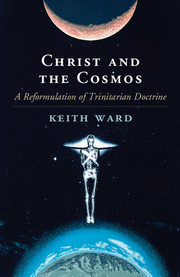Book contents
- Frontmatter
- Contents
- Preface
- Acknowledgements
- PART I THE THREEFOLD NATURE OF THE DIVINE BEING
- PART II THE BIBLICAL SOURCES OF TRINITARIAN THOUGHT
- PART III THE TRINITY, IMMANENT AND ECONOMIC
- PART IV THE SOCIAL TRINITY
- 22 Persons and Substances
- 23 The Idea of a Personal and Free Creation
- 24 The Logical Uniqueness of Persons
- 25 The Divine Nature and Freedom
- 26 Freedom in God and in Creatures
- 27 Persons as Necessarily Relational
- 28 An Ontology of the Personal?
- 29 Intra-Trinitarian Love
- 30 Infinite Gods
- 31 Divine Love and Necessity
- 32 Love and Alterity
- 33 Trinity versus Monotheism
- 34 The Passion of Christ
- 35 God and Abandonment
- PART V THE COSMIC TRINITY
- Bibliography
- Subject Index
- Name Index
22 - Persons and Substances
from PART IV - THE SOCIAL TRINITY
Published online by Cambridge University Press: 05 September 2015
- Frontmatter
- Contents
- Preface
- Acknowledgements
- PART I THE THREEFOLD NATURE OF THE DIVINE BEING
- PART II THE BIBLICAL SOURCES OF TRINITARIAN THOUGHT
- PART III THE TRINITY, IMMANENT AND ECONOMIC
- PART IV THE SOCIAL TRINITY
- 22 Persons and Substances
- 23 The Idea of a Personal and Free Creation
- 24 The Logical Uniqueness of Persons
- 25 The Divine Nature and Freedom
- 26 Freedom in God and in Creatures
- 27 Persons as Necessarily Relational
- 28 An Ontology of the Personal?
- 29 Intra-Trinitarian Love
- 30 Infinite Gods
- 31 Divine Love and Necessity
- 32 Love and Alterity
- 33 Trinity versus Monotheism
- 34 The Passion of Christ
- 35 God and Abandonment
- PART V THE COSMIC TRINITY
- Bibliography
- Subject Index
- Name Index
Summary
In much recent theology, the idea of the Trinity which I have defended, the idea of it as consisting of three ‘forms of existing’ of the one divine Subject, has been opposed by an influential stream of thinking that prefers to think of the Trinity as a society or communion of three individual subjects – more like ‘persons’ as they are generally understood. I have suggested that traces of this view can be found in the writings of Barth, Rahner, and Lacugna, even when these writers explicitly oppose it. I believe that this ‘social Trinity’ idea is more misleading than helpful but that in fact when both social and unitive views of the Trinity are qualified to take account of the unique nature of the Trinity, both views tend to converge, like different metaphors trying to grasp the same reality from different angles. There is, though, good reason to mount a resolute defence of monotheism, and therefore in the end to insist upon a unitive view of the Trinity. That is the case I am going to defend.
In this part I shall mainly consider and criticise the views of John Zizioulas, Richard Swinburne, and Jurgen Moltmann, who have defended a social view of the Trinity. Then, in Part V, I shall argue that the social view and the one-consciousness view are both heavily qualified by their modern defenders, who appeal, respectively, to doctrines of perichoresis and of the nature of God as love. I shall conclude by offering a positive account of the essentially threefold nature of God, which is built on acceptance that God is a dynamic, creative, and passionate God who generates an emergent cosmos within which creatively free persons are intended to grow into union with the divine nature, a union foreshadowed in Jesus Christ.
The Greek Orthodox Metropolitan Bishop John Zizioulas has introduced into reflection on the Trinity the thought of some early Orthodox theologians who were relatively overlooked in the West. He argues that the Cappadocian fathers of the Greek Orthodox Church brought about a conceptual revolution in human thought about persons when they formulated a new and distinctive view of the Trinity.
- Type
- Chapter
- Information
- Christ and the CosmosA Reformulation of Trinitarian Doctrine, pp. 145 - 150Publisher: Cambridge University PressPrint publication year: 2015



